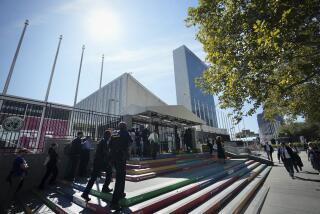U.N.’s Postwar Role ‘Vital,’ Say Bush, Blair
- Share via
HILLSBOROUGH, Northern Ireland — President Bush and British Prime Minister Tony Blair said Tuesday that the United Nations would play “a vital role” in the reconstruction of Iraq. But their language as well as their refusal to offer details suggested a looming diplomatic brouhaha over the extent of an international role in a postwar Iraq.
During a joint news conference here after their latest summit, Bush did little to conceal his preference for a subordinate role for the U.N., one in clear deference to the U.S.-led coalition.
“A vital role for the U.N. means food, that means medicine, that means aid, that means a place where people can give their contributions, that means suggesting people for” an interim Iraqi governing body, Bush said.
Neither Bush nor Blair defined the specific roles -- or limits -- for the U.N. or for nations such as Russia, Germany and France, which are eager to participate in the reconstruction but had strongly resisted the efforts to disarm Iraq through force. Leaders of these three countries want the U.N. to have a major part in helping shape postwar Iraq.
Blair also has spoken in favor of a broad international reconstruction effort. But it was unclear how much, if at all, he and Bush were able to narrow their differences over the U.N.’s role. On Tuesday, after his third meeting with Bush in the last month, Blair said:
“The important thing is not to get into some battle about words of the precise role here or there, but let’s all work together internationally -- the coalition forces, the international community together -- to do what we really should be doing, which is making sure that the will of the Iraqi people is properly expressed in institutions that in the end they own, not any outside power or authority.”
During their news conference, Bush said he does not know whether Saddam Hussein is dead or alive after a U.S. airstrike Monday. But making a two-handed gesture as if choking someone, he said:
“So the only thing I can tell you is that that grip I used to describe that Saddam had around the throats of the Iraqi people is loosening. I can’t tell you if all 10 fingers are off the throat, but finger by finger, it’s coming off.”
The president renewed his pledge that coalition troops will press on until Hussein’s regime is ousted, and then remain long enough to get the country up and running. He said an Iraqi interim authority -- including Iraqis within the country as well as exiles -- would serve “until a permanent government can be chosen by the Iraqi people.”
Neither Bush nor Blair discussed how long that process could take. White House national security advisor Condoleezza Rice said later Tuesday that, with the fighting still going on, “nobody wants to try to have a fixed timetable on when to take what steps.”
In discussing Iraq’s transition to a democracy, Bush at one point evinced clear impatience.
“I hear a lot of talk here about how we’re going to impose this leader or that leader. Forget it,” he said.
“From day one, we have said the Iraqi people are capable of running their own country. That’s what we believe. The position of the United States of America is, the Iraqis are plenty capable of running Iraq. And that’s precisely what is going to happen,” the president added.
In a joint statement after their press conference, the two leaders said the U.S. and Britain will seek adoption of a new resolution by the U.N. Security Council that would back an “appropriate post-conflict administration for Iraq.”
It remained unclear after the summit when an Iraqi interim authority would be formed. But Washington and London would like to do so as soon as possible to allay suspicions in the Arab world that the U.S. and Britain are interested in exerting long-term influence in the oil-rich nation. A U.S. delegation is en route this week to Iraq to “begin the process of bringing together a group that would constitute the authority,” said Secretary of State Colin L. Powell.
During their meeting at Hillsborough Castle, just south of Belfast, Bush and Blair also discussed the Middle East peace process, as well as the current deadlock in carrying out the 5-year-old Belfast peace accord.
Bush renewed his pledge to soon release a Middle East peace plan known as the “road map” toward the creation of a Palestinian state -- once the new Palestinian prime minister and his Cabinet are confirmed.
The president also threw his weight behind the 1998 Good Friday agreement, which seeks to end the decades-old sectarian conflict in Northern Ireland. In a meeting with six Northern Ireland political leaders, Bush said he urged them to rededicate themselves toward the final implementation of the agreement.
Such action, he told them, can demonstrate to the Israelis and Palestinians that determination to find peace can succeed.
More to Read
Sign up for Essential California
The most important California stories and recommendations in your inbox every morning.
You may occasionally receive promotional content from the Los Angeles Times.













